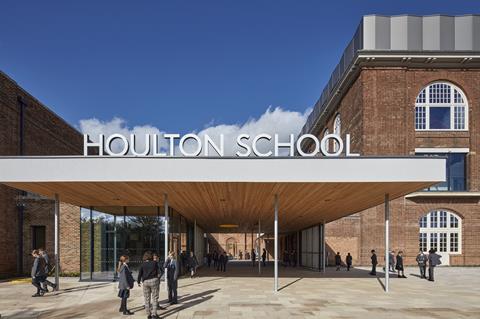Read about the winner and shortlisted entries for this year’s ºÚ¶´ÉçÇø Magazine Project of the Year award
Winner: Houlton School
Entered by Urban&Civic / Morgan Sindall Construction / van Heyningen and Haward

Houlton School is an entirely new state school delivered by the private sector and the Department for Education, encompassing three listed buildings, and designed as the centrepiece of a future district centre. Challenges overcome in the project to convert the former Rugby Radio Station included no circulation, no insulation and significant contamination.


Runners-up
Bloom Clerkenwell
Entered by HB Reavis
Bloom Clerkenwell in London’s Islington was built on the principles of health and wellbeing. Delivered on time and within budget, every design decision was taken with sustainability in mind. It is the first commercial building that will achieve WELL Platinum, BREEAM Outstanding, EPC rating A, and net zero carbon in operation. The project team includes HB Reavis Construction, John Robertson Architects and Buro Happold.
Compton and Edrich stands, Lord’s
Entered by ISG
Marylebone Cricket Club’s brief to ISG to redevelop these stands was to rebuild them with increased capacity, greater accessibility and improved facilities. Work commenced in August 2019, with a phased completion for each cricket season. It included complex elements such as column-free views, curved roof canopies, integrated score and replay screens, and world-leading spectator facilities.
F51
Entered by Jenner Group
Local philanthropist Sir Roger De Haan recognised that this site in Folkestone, which was destined to become a multistorey car park, presented a prime opportunity to deliver instead a community asset that would continue the area’s regeneration. The building creates a one-stop shop for a host of social services. Its facilities also include the South-east’s tallest climbing wall, a bouldering course and Olympic standard boxing facilities.
Grafton Way ºÚ¶´ÉçÇø, University College Hospital
Entered by Bouygues UK
This project combined sustainable design, sophisticated medical technology, complex logistics and civil engineering with carefully managed construction – all delivered on Tottenham Court Road in central London – and included engineering a basement the size of the Albert Hall to house the proton beam therapy centre. Planning restrictions meant six of its 13 storeys were built underground.
Sandwell Aquatics Centre
Entered by Wates Construction
This time-sensitive project near Birmingham had three phases, including building facilities for the 2022 Commonwealth Games and then converting the facility to a legacy community building. There was a clear focus on procurement of critical packages and a risk mitigation strategy from the start, while materials were sourced locally wherever possible to provide security of supply.
St Hilda’s College front of college redevelopment
Entered by Beard / Gort Scott
Among the most impressive achievements on this project – which started with a tender far beyond the client’s budget and underwent extreme value engineering – was that it was delivered on schedule, almost identical to the original design, and for 25% less than the original cost. Its success also comes from a focus on the lived experience of the college community.
St Sidwell’s Point Leisure Centre
Entered by Kier Construction
St Sidwell’s Point is the UK’s first leisure centre built to the Passivhaus standard. It will achieve an annual energy saving of 70% compared with a ºÚ¶´ÉçÇø Regulations compliant scheme and is designed for 2080 climate predictions. The new centre, in Exeter, provides a 25m, eight-lane competition pool, a 20m community pool, a children’s confidence pool, and a health and fitness centre including a hydrotherapy pool and saunas.
The Londoner
Entered by Woods Bagot
Woods Bagot has spent close to a decade creating The Londoner, a luxury urban resort. This 16-storey project has been integrated into the historic urban fabric of London’s Leicester Square and features 350 guest rooms, two cinemas, six restaurants and bars, a spa and wellness facility, meeting and conference spaces and one of London’s largest event spaces – despite the 50m x 50m site’s challenging constraints.
The Marshall ºÚ¶´ÉçÇø
Entered by Mace
The Marshall ºÚ¶´ÉçÇø for the London School of Economics and Political Science has a design that makes great use of brutalist architecture, with concrete trees that branch out to support the structure, and a striking helical staircase. An energy-efficient design was achieved whereby the 1,145 precast panels that make up the low carbon facade were manufactured offsite, reducing time and costs as a result.



























No comments yet